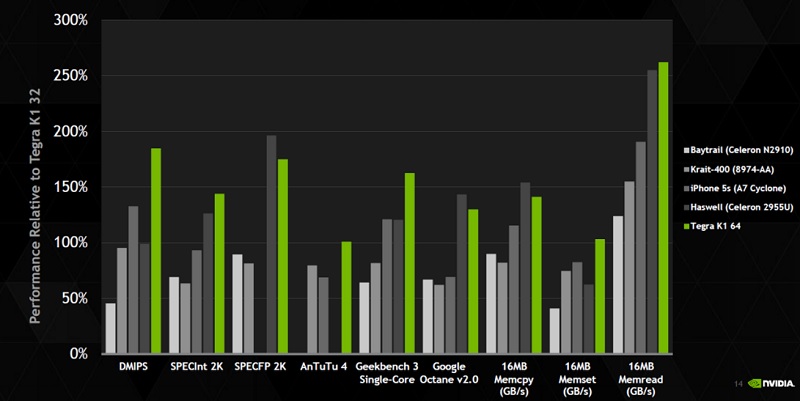Nvidia has released some new information surrounding their upcoming 64-bit Tegra K1 variant, codenamed 'Project Denver', discussing the architecture of the chip while also making some bold performance claims.
From past looks at Project Denver, we already know that the SoC is compatible with the ARMv8 architecture, packing two custom-made 64-bit Denver CPU cores clocked up to 2.5 GHz onto the die. There's also the same 192-core mobile Kepler GPU as the 32-bit Tegra K1, providing extreme graphics performance. Both the 64-bit and 32-bit Tegra K1 SoCs are pin-compatible.
Diving deeper into the Denver CPU cores, and Nvidia has revealed some info on the architecture being used. Each Denver core uses a seven-way superscalar microarchitecture that's capable of seven operations per clock cycle at best, leading to high throughput when conditions are ideal. During typical usage patterns it's unlikely you'll achieve seven operations per cycle, but it's impressive nevertheless.
Interestingly, Denver also uses binary translation in a software layer below the operating system to convert ARMv8 instructions to native instructions on the fly. Through dynamic code optimization, Nvidia claims it can tune microcode routines to improve performance and efficiency, at the expense of some overhead. These routines can be stored in 128MB of optimization cache for extremely fast re-access in the future.
There's also new power saving features, including dynamic clock and voltage scaling, power-gating, and "low latency power-state transitions". This should allow the Denver-based SoC to compete on a performance level with "some mainstream PC-class CPUs" while consuming less power.

Interestingly, in Nvidia's performance comparison charts, the 64-bit Tegra K1 is shown outperforming Intel's Celeron 2955U CPU, which is at the lower end of the Haswell line-up. It's also seen to dominate Intel's Bay Trail chip and outstrip Qualcomm's Snapdragon 800.
Of course these are Nvidia-produced charts, where there's no mention of final power consumption or thermal output. To see how the Denver-based Tegra K1 stacks up, we'll just have to wait until it's released into the wild, which should happen towards the end of the year.
